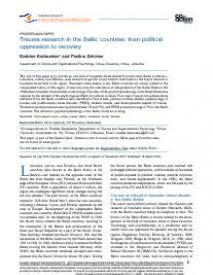Trauma research in the Baltic countries: from political oppression to recovery
The aim of this paper is to provide an overview of traumatic stress studies from the three Baltic countries—Lithuania, Latvia, and Estonia—and reveal how specific social context contributes to the topics relevant in traumatic stress field in the region. Traumatic stress studies in the Baltic countries are closely related to the complicated history of the region. It was only since the restoration of independence of the Baltic States in the 1990s when traumatic stress studies could emerge. The start of the psychotraumatology in the Baltic States was inspired by the interest of the psychological effects of political violence. Four major topics in traumatic stress literature from the Baltic countries were identified in this article: political violence studies, epidemiology of trauma and posttraumatic stress disorder (PTSD), disaster studies, and developmental aspects of trauma. Traumatic events prevalence was reported between 70 and 75%, and PTSD prevalence range 2–7% in the Baltic countries. The interest in psychotraumatology in the Baltic countries is rising.
Geachte bezoeker,
De informatie die u nu opvraagt, kan door psychotraumanet niet aan u worden getoond. Dit kan verschillende redenen hebben,
waarvan (bescherming van het) auteursrecht de meeste voorkomende is. Wanneer het mogelijk is om u door te verwijzen naar de bron
van deze informatie, dan ziet u hier onder een link naar die plek.
Als er geen link staat, kunt u contact opnemen met de bibliotheek,
die u verder op weg kan helpen.
Met vriendelijke groet,
Het psychotraumanet-team.
Reference:
Evaldas Kazlauskas, & Paulina Zelviene | 2016
In: European journal of psychotraumatology, ISSN 2000-8066 | 7 | 29295
http://www.ejpt.net/index.php/ejpt/article/view/29295
In: European journal of psychotraumatology, ISSN 2000-8066 | 7 | 29295
http://www.ejpt.net/index.php/ejpt/article/view/29295


